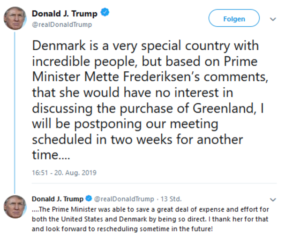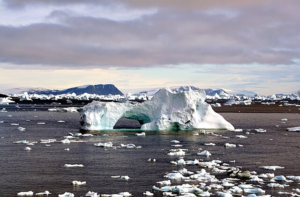In the month of August 2019, Donald Trump startled the entire world by expressing his interest in purchasing Greenland, which is the largest island in the world and is a territory that is directly under Danish sovereignty. There are reports that indicate that President Trump has brought up the concept on multiple occasions with his advisors and has even given instructions to his White House counsel to investigate the logistics of such a transaction. Within the media and on various social media platforms, the disclosure was welcomed with a mixture of laughter and astonishment. Mette Frederiksen, the Prime Minister of Denmark, referred to the concept as “absurd,” which prompted President Trump to call off a state visit that was scheduled to take place in Denmark.

The surprising interest that Donald Trump has shown in purchasing Greenland in 2019 has captured the attention of people all over the world, causing curiosity and debate regarding his intentions, the possibility of such a purchase, and the geopolitical consequences that would result from such a transaction. Although the concept of purchasing Greenland appeared to be completely out of the ordinary to many people, it was not completely unheard of, nor was it devoid of any strategic rationale.
Donald Trump, who is running for president, has been expressing his desire to acquire Greenland over the past few weeks. He has also been discussing the possibility of retaking control of the Panama Canal and establishing Canada as the “51st state.” Additionally, Donald Trump asserted that he would not “rule out any use of military force when it comes to these difficulties.” Despite this, European leaders Scholz and Macron dismissed his overtures, stating once more that the island is not available for purchase. They also cautioned him that any unlawful attempt to acquire control of the massive Arctic island will be faced with military action, and that the European Union has the right to protect its territory.

Donald Trump Jr., the son of the incoming president, had a brief journey to Greenland on Tuesday, which coincided with the announcement that the president-elect had authorized the purchase of the island. In a post that he published on the social media platform Truth Social on Monday, he stated, “Greenland will benefit tremendously if, and when, it becomes part of our Nation.” He went on to say, “We will protect it, and cherish it, from a very vicious outside World.” A RESTORATION OF GREENLAND’S GREATNESS!
After arriving in Greenland, Don Jr. made the following statement: “These are people who feel that they have been exploited.” The Danish government has not treated them in a fair manner. It is being prevented from them from making use of their natural resources, whether it be coal, uranium, rare earths, gold, or diamonds. It is very much a wonderful location.

What draws Trump’s interest in Greenland?
1. Political and Geopolitical Importance
Greenland occupies a strategically important position in the Arctic region, sitting between North America and Europe. With the Arctic becoming a focal point for global power competition due to melting ice and emerging sea routes, Greenland’s location is of immense strategic value. The island serves as a gateway to the Arctic, where nations are fighting for control over newly available resources and shipping lines.
By way of the Thule Air Base, which is an essential location for missile defense and early warning systems, the United States of America already keeps a military presence in Greenland. Through the acquisition of Greenland, the United States military would be able to deepen its footing in the Arctic area, which would allow for increased control and surveillance in the region. The significance of this cannot be overstated in light of the fact that Russia and China are expanding their activities in the Arctic, which include the construction of military bases and the pursuit of resource extraction.
2.Sources of Natural Resources
Rare earth minerals, oil, gas, and precious metals are only some of the natural resources that Greenland possesses in exceptional quantities. Particularly important for the development of modern technologies like smartphones, electric vehicles, and renewable energy systems are components that are classified as rare earth elements. The United States is extremely dependent on China for the importation of rare earths; but, if Greenland’s resources were secured, this dependence may be reduced.
Additionally, as a result of climate change, Greenland’s ice sheets are melting, which might result in a greater portion of the country’s resource-rich territory being made available for exploration and the extraction of resources. According to Trump, who is well-known for his emphasis on energy independence, Greenland was most likely viewed as a long-term investment that had enormous economic potential.

3. Potential Benefits of Trade
The terrain of the Arctic is undergoing fast transformation as a result of climate change, which presents both difficulties and opportunities. Melting ice is opening up new shipping routes, such as the Northwest Passage, which might lower global shipping distances and prices for the whole world, while helping the U.S as a whole.. Controlling Greenland would offer the U.S. a strategic advantage in navigating and potentially dominating these burgeoning trade routes.
In addition, as a result of climate change, Greenland’s ice is getting thinner, which means that more of the country’s land is becoming accessible for development, the extraction of resources, and scientific research. Given the current state of the environment, it is possible that President Trump considered Greenland to be an extremely valuable asset.
4. Previous Examples from History
The notion that the United States of America may acquire Greenland is not a novel one. Following the acquisition of Alaska from Russia in 1867, the United States of America investigated the possibility of gaining Greenland and Iceland. During the early stages of the Cold War, President Harry Truman made an offer to Denmark amounting to one hundred million dollars in gold for Greenland. This was done in recognition of Greenland’s strategic importance. Despite the fact that Denmark declined the offer, the United States continued to keep a presence on the island through the Thule Air Base.
President Trump most certainly believed that he was following in the footsteps of other leaders who had undertaken land acquisitions that had a transformative effect, such as Thomas Jefferson with the Louisiana Purchase and William Seward with the Alaska Purchase among others. It is possible that he saw the acquisition of Greenland to be an accomplishment that would define his legacy.
Implications for Geopolitical Action
The fact that Trump is interested in Greenland brought to light deeper tendencies in the geopolitics of the Arctic. As a result of the acceleration of climate change and the increased accessibility of the Arctic, nations are increasingly competing with one another for influence and resources present in the region. In recent years, the Arctic Council, which is an intergovernmental organization consisting of Arctic nations, has emerged as a central location for discussions concerning environmentally responsible development and sustainable development. However, conflicts between major nations pose a threat to the region’s ability to participate in cooperative endeavors.
Russia’s Expansion Into the Arctic
Reopening bases that were established during the Soviet era and deploying cutting-edge weaponry are just two examples of Russia’s aggressive expansion of its military and economic activity in the Arctic. Using the United Nations Convention on the Law of the Sea (UNCLOS) as a basis, it has also asserted its ownership over extensive stretches of the underwater terrain in the Arctic.
China’s Aspirations in the Arctic
China has declared itself a “near-Arctic state” and has been investing in Arctic infrastructure and resource projects, despite the fact that it is not a nation that is now located in the Arctic. The establishment of a “Polar Silk Road” is a component of its Arctic policy, with the goal of easing the flow of commerce across the region.
Strategy of the United States in the Arctic
Although the United States has been rather reluctant to formulate a clear policy for the Arctic area, the fact that President Trump is interested in Greenland has brought to light the necessity of increased participation in the region. It would have been beneficial for the United States to acquire Greenland because it would have strengthened its position in the Arctic and increased its capacity to counteract the influence of Russia and China.
Let me ask you this: what are your thoughts on Donald Trump’s proposal to purchase Greenland? What do you think about this idea?
